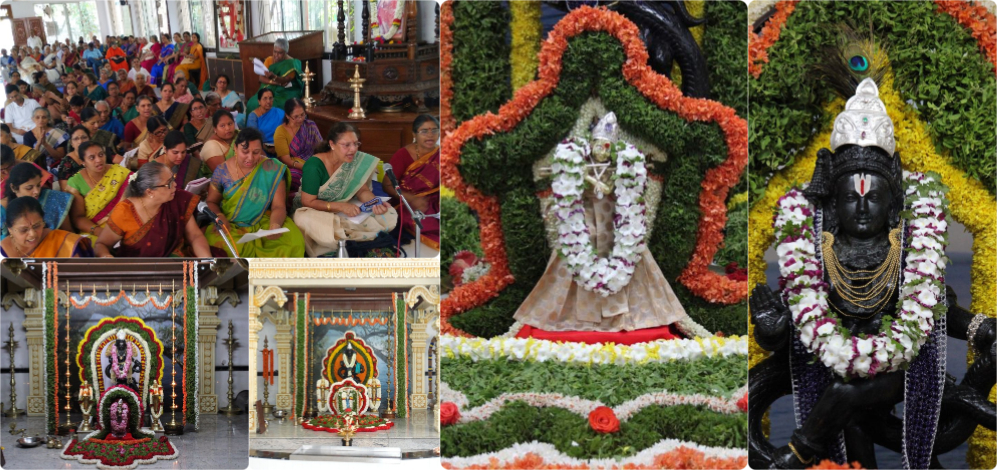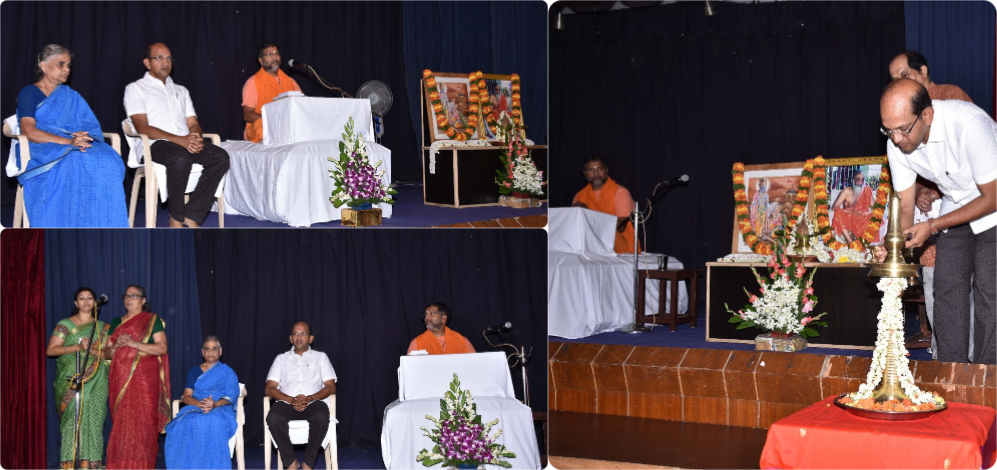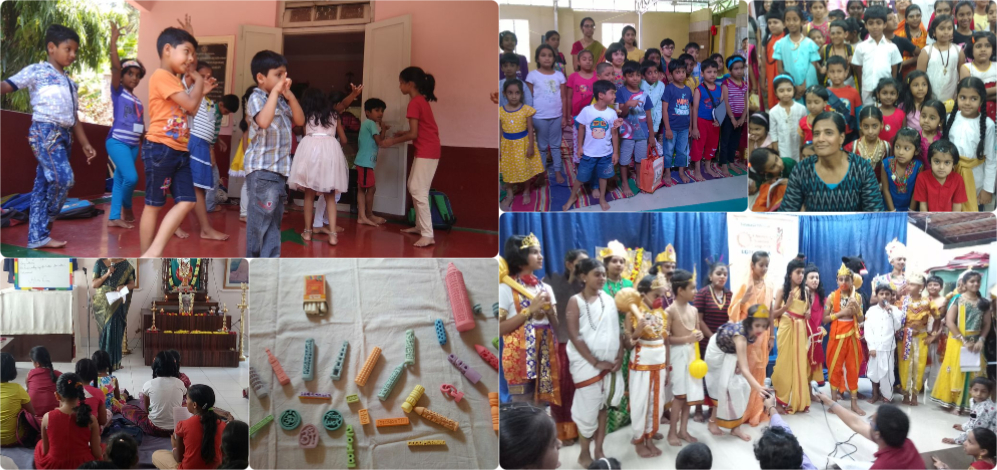Gita Jnana Yajna by Pujya Swami Krutatmananda
Pujya Swami Krutatmananda of Hubli & Dharwad centres conducted a Gita Jnana Yajna in Kannada at Deenabandhu Temple, Indiranagar from 22nd to 28th April, 2018 taking Bhagavad Gita Chapter – 14. The Yajna was inaugurated by Sri Ravikumar, senior devotee of the Mission. Pujya Swamiji explained that the essence of the Gita is to inspire us to know our own real nature. God is not somewhere outside but our very inner core. Each individual creates his own Jagat based on raga and dwesha. It is extremely important to rise above all the three Gunas and lead a calm life without getting perturbed by the dualities with the firm understanding that outer objects have no influence on our mind.
The Yajna was very well attended.
Geeta Jnana Yajna by Pujya Swami Aparajitananda
Pujya Swami Aparajitananda of Mangalore centre conducted a Geeta Jnana Yajna in English on Mukunda Mala in Snea Bhavan, Sahakaranagar from 24th to 30th April, 2018 The Yajna was inaugurated by Smt Thangam Nambiar, senior devotee of Pujya Gurudev.
Real devotion, Swamiji explained is in forgetting all body consciousness and trying to merge with the Self. Sin is not in any action, but the sense of doership which starts pricking the conscious. The greatest tragedy of the human mind is in associating with the body and the actions performed then leads to untold misery boosting one’s ego. Total surrender at the lotus feet of the Lord or Guru helps in coming out of this shackle and all actions performed with the attitude of seva and non possessive nature gather beauty and efficiency in them. All our epics deal with such stalwarts who have shown the golden path by their very day to day living to inspire all future generations.
The Yajna was very well attended.
Deenabandhu Pratishta Day
Pratishta Day of Deenabandhu Kaliamardhana Krishna temple in Indiranagar was observed on Sunday, 29th April, 2018 with nonstop bhajans, abhisheka to Lord Ganesha, Krishna and Hanuman followed by alankara and aarati. The wonderful soul stirring melodious bhajans by various groups lent a unique divine atmosphere with Swamijis of Karnataka gracing the occasion.
Kalia Mardhana Krishna idol was first installed on 5th March, 1978 and was concecrated by Pujya Gurudev Swami Chinmayananda on 24th March, 1978. “You will realise the glory of this temple after 10 years”, prophesized Pujya Gurudev. Extension of the temple hall was undertaken in 1987 and the pratishta of Lord Ganesha and Hanuman was done by Pujya Gurudev on 3rd March, 1988. The needs of the ever increasing devotees needed one more extension and the renovation was taken up in 2011 and the renovated temple was inaugurated by Pujya Swami Tejomayananda on 13th May, 2012.
The Kalia Mardhana Krishna idol is carved out in single black granite piece with the Lord dancing on seven hooded serpent representing the negative tendencies and only when we surrender completely to the Lord, He will ensure that we overcome the negative tendencies and in due course realise the Supreme Brahman. The significance of the Lord’s triumph over the serpent is also the symbol of triumph of spirit over matter. Deenabandhu Krishna is flanked on the right by Lord Ganesha representing auspiciousness and on the left by Lord Hanuman representing valor and humility.
Satsang by Pujya Swami Brahmananda
Pujya Swami Brahmananda participated in the famous Ramanavami celebrations on Monday, 9th April, 2018 at N R Colony Rama Mandir where a galaxy of philanthropists from all over the city were present. Pujya Swamiji took Sharanagati extolling the glory and beauty of total surrender by Hanuman at the feet of his Lord. In a power packed emotional outpour, Pujya Swamiji took the audience to untold heights of divine ecstasy urging all to develop the qualities of Hanuman for a healthy family and society. The Satsang was attended by thousands of devotees from all over the city.
Balavihar Summer Camps in Bengaluru – 2018
Summer camps for children were organised in eight different venues across the city throughout the month of April – 2018 with duration of each camp ranging from 12 to 15 days. The camps were attended by not only the Balavihar children but also from the local neighbourhood with average attendance of 50 to 70 children. The theme of the camps also was unique – Humanity to Divinity, Great Rishis in our culture, characters of Ramayana, Bharatanatyam, different forms of painting, paper art, chalk art, rice art and puppet show. The camps also introduced several new bhajans, shlokas, stotrams, unheard stories from our puranas, quiz and unique character building techniques that were very well received by the children. The children also put up on the spot skits conceived, managed and staged in their own unimaginable perfection that left the elders dumbfounded. The camps also saw the children learning new chapters of the Bhagavad Geeta and participating in many social activities like street cleaning, creating awareness of traffic & law maintenance, gardening, language skills, cooperative living and working. Pujya Gurudev’s vision of children being the nation builders was clearly visible.


